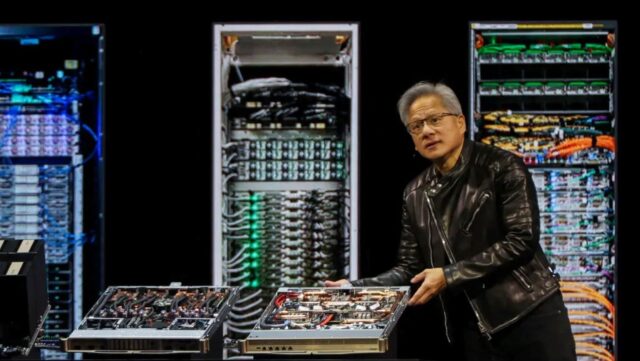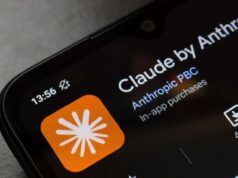
Nvidia, a leading American technology company, has received approval from the United States government to resume sales of its advanced AI chips, specifically the H20 model, to China. This significant development follows a recent meeting between Nvidia CEO Jensen Huang and President Donald Trump. The company announced late Monday that the US government has “assured” Nvidia that licenses will be granted, and deliveries are expected to begin soon.
Key Takeaways:
- Nvidia can now sell its H20 AI chips to China after a US government assurance.
- This decision comes after Nvidia CEO Jensen Huang met with Donald Trump and other US policymakers.
- The H20 chip was designed to comply with previous US export restrictions but was later banned.
- The resumption of sales is a major win for Nvidia in the crucial Chinese market.
- The move suggests a potential easing of tensions in US-China tech trade.
The approval marks a notable shift in the US administration’s stance on semiconductor exports to China, which have been subject to tight controls due to national security concerns. Earlier this year, in April, the White House had restricted sales of Nvidia’s H20 chips, a move that Nvidia stated could result in an estimated $5.5 billion in lost revenue. Jensen Huang, alongside other tech executives, had been actively lobbying for an easing of these restrictions, arguing that such limits would hinder American companies’ competitiveness and risk losing ground in one of the world’s largest technology markets.
The H20 graphics processing unit (GPU) is a specialized AI chip that Nvidia developed to comply with prior US export regulations. While it is less powerful than Nvidia’s top-tier semiconductors like the H100 and H200, which remain off-limits to China, the H20 still represents a crucial component for building and updating various AI systems. Nvidia had created modified versions of its chips, including the A800 and H800, specifically for the Chinese market after earlier restrictions in 2022. However, these too were later banned in October 2023. The renewed approval for the H20 highlights the complex and evolving nature of technology trade policies between the two economic powers.
Jensen Huang is currently in Beijing to attend the 3rd China International Supply Chain Expo, marking his third visit to China this year. During his visit, he also confirmed the development on Chinese state-run CGTN and in remarks shared on social media, emphasizing the importance for American companies to compete in China’s dynamic and innovative market, where half of the world’s AI researchers are based.
For Nvidia, this policy reversal is a significant commercial victory, potentially allowing the company to recover a substantial portion of its previously written-off inventory and re-establish its strong presence in the Chinese market. China accounts for approximately 13% of Nvidia’s annual revenue, making it a critical market for the chipmaker’s overall growth. The news has been positively received by investors, with Nvidia’s shares seeing an upward trend following the announcement.
While the exact details of the discussions between Jensen Huang and Donald Trump remain private, the outcome indicates a successful lobbying effort by Nvidia. This development also aligns with recent signs of thawing US-China trade relations, which have seen China relaxing controls on rare earth exports and the US allowing some chip design software services to resume in China. However, policymakers in Washington remain divided on the long-term implications of such policy shifts, with some expressing concerns that even less powerful AI chips could inadvertently aid Beijing’s technological advancements, including potential military applications.
Frequently Asked Questions (FAQs)
Q1: What are Nvidia’s H20 chips and why are they important?
A1: Nvidia’s H20 chips are advanced artificial intelligence (AI) accelerators. They are specifically designed versions of Nvidia’s GPUs (Graphics Processing Units) that comply with US export restrictions for sales to China. These chips are vital for training and running complex AI models and systems, making them central to the development of AI technology.
Q2: Why did the US government previously restrict Nvidia’s AI chip sales to China?
A2: The US government imposed restrictions on the sale of advanced AI chips to China due to national security concerns. The aim was to prevent China from accessing cutting-edge technology that could be used for military modernization or to gain a strategic advantage in AI.
Q3: How will this decision impact Nvidia’s business?
A3: This decision is a major positive for Nvidia. China is a significant market, accounting for a notable portion of Nvidia’s revenue. Resuming sales of the H20 chips allows Nvidia to regain market share, potentially recover revenue lost due to previous restrictions, and continue to serve a large and innovative AI development community.
Q4: Does this mean all US AI chip export restrictions to China are lifted?
A4: No, this does not mean all restrictions are lifted. The approval is for the H20 chips, which are less powerful versions designed to meet earlier compliance standards. Nvidia’s most advanced chips, such as the H100 and H200, still remain under export control and cannot be sold to China.
Q5: What role did Nvidia CEO Jensen Huang play in this development?
A5: Jensen Huang played a key role through direct engagement with US policymakers, including President Donald Trump. He actively lobbied against the restrictions, highlighting the importance of the Chinese market for American companies and arguing that the controls could disadvantage US firms while encouraging domestic AI development in China.










